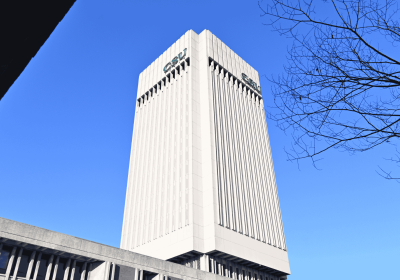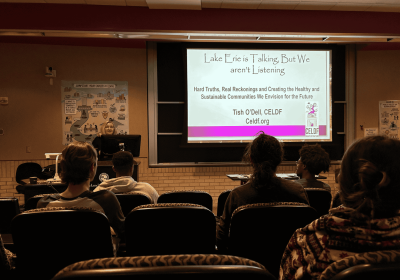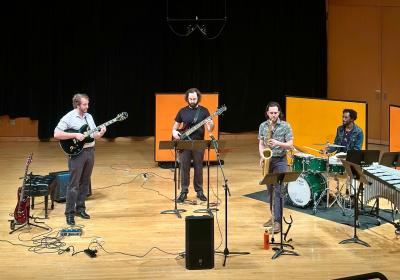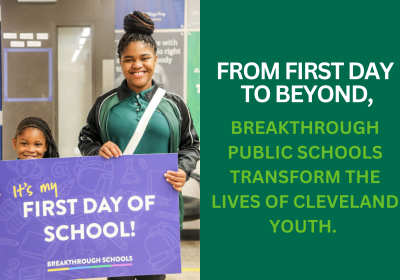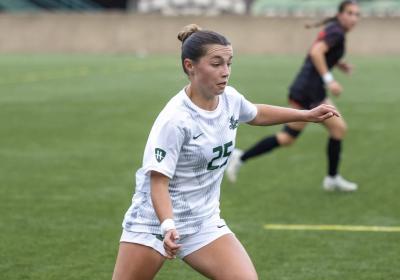![Cleveland State University's Provost and Senior Vice President for Academic Affairs, [Nigamanth Sridhar, Ph.D.], speaks to the faculty senate, Sept. 3, 2025, about the RTA bus pass system.](/sites/default/files/styles/article_media_image_style/public/2025-09/NEWS-FACULTY-SENATE-1-16x9.jpg?itok=nHVm_W7p)
CSU sees steep drop in international enrollments in fall intake
Concerns about a decrease in international student enrollment for the fall semester at Cleveland State University were raised at the Sept. 3 faculty senate meeting.
"We started to hear from our recruiting partners that in the spring semester there was a general feeling across the student population that they were less likely to come to the United States because of all the various rhetorics about immigration,” Provost Nigamanth Sridhar, Ph.D., told the faculty senate at its first meeting of the semester.
Sridhar did not name the administration of President Donald Trump. But rhetoric, and action from the White House restricting student visas, as well as waves of Ice and police raids on campuses and the detention of students in recent months have made many potential students think twice about the U.S. and as an education destination.
In August, Signal Cleveland said the likely impact on Ohio of the Trump administration's policies could cost the state’s economy hundreds of millions of dollars.
Crain's Cleveland Business in May reported that the expected drop in international students at CSU could cost the university $11.5 million in tuition revenue tied to the university's global outreach program operated in partnership with Shorelight.
On Thursday, citing figures from the CSU board of trustees' financial affairs committee, Crain's reported a projected drop of about 1,400 (41%), in international students for fall 2025 compared to fall 2024.
Sridhar told the faculty senate the good news was that applicants for admission in fall represented 26 countries, in contrast to recent intakes which had primarily brought in students from two countries, with the majority of international students coming from India. CSU's Vice President of enrollment management Randall Deike told the board on Thursday, "Indian students getting to the U.S. has been a real challenge this year."
According to Crain's, enrollment overall was down about 700 students in fall, to 13,107, short of the budgeted target of 13,850.
However, due to increased demand for online programs, an uptick in retention and various cost saving measures, CSU's administration told the board it expects to balance the school's budget this year.
Student RTA bus pass system
In late July, CSU President Laura Bloomberg, Ph.D., told students in an email that the recent state’s budget laws about how student fees are used had forced CSU to cancel the bus pass system, which had been paid out of student fees.
Ohio Gov. Mike DeWine’s office responded a week later, calling CSU’s reading of the law “ridiculous.” That, and pushback from students, triggered an abrupt about turn by the Cleveland State administration, which told the faculty senate that full-time students would have access to the pass on an opt-in basis.
“We have entered into an agreement with the RTA for this year, just for this year, to say that the university will continue the financial arrangement with the RTA,” Sridhar told the faculty senate. “We will pay them for all of our students, but then we will only charge the fee to those students who actually stop by and pick up the U pass.”
Sridhar added that as of Sept. 5, over 1400 students had opted in to receive a bus pass.
The collaboration between CSU and RTA has been in place since 2006, but it is unsure moving forward if CSU will cover the financial arrangements allowing students to purchase the university-priced $57.50 bus passes. If not, students will have to buy the $95 monthly bus pass that RTA provides for the public.
Plans for the Wolstein Center
In late August, the CSU board of trustees voted to approve a negotiation with the United Soccer League (USL) Cleveland to transform the Wolstein Center into a new soccer stadium.
The proposal for an open-air stadium that can be multipurpose for hosting men’s and women’s professional soccer, concerts, festivals, amateur sporting events, commencement ceremonies, and community gatherings would allow an increase in tourism and activities in Cleveland.
During the faculty senate meeting, President Bloomberg updated the community on the timeline for the planned changes to the Wolstein Center.
“We announced last week that the board approved us entering into negotiations for possible use of the Wolstein Center site,” Bloomberg said. “That could take more than a couple years to get done.”
According to CSU officials, one of their main priorities through this process is still men’s and women’s basketball, as it is still in the early stages. Fans and student athletes will still be able to utilize the Wolstein Center for many years before any construction begins.
AI teaching and learning labs coming to CSU
CSU Director of First-Year Writing Melanie Gagich updated the faculty senate on plans to expand access to AI on campus with an AI teaching and learning lab.
“It's going to be a student focused space, in which the academic support hub is dedicated to AI literacy and the responsible use of AI tools,” Gagich said. “We're not here to try to make a space to make it easier for students to misuse AI, as this is going to be a space that promotes learning and promotes literacy and AI fluency.”
With the growing use of artificial intelligence, the labs will allow students to become more knowledgeable in using the technology as a tool rather than a fast-pass with several workshops on AI coming soon.
“Students will be able to explore AI through peer tutoring, interactive faculty led workshops and a hands-on AI sandbox,” Gage said.
The first interactive faculty-led workshop on AI and writing will be on Sept. 25 allowing students to know the basics on using AI before entering the workforce.
The next CSU faculty senate meeting is scheduled for Oct. 1.


